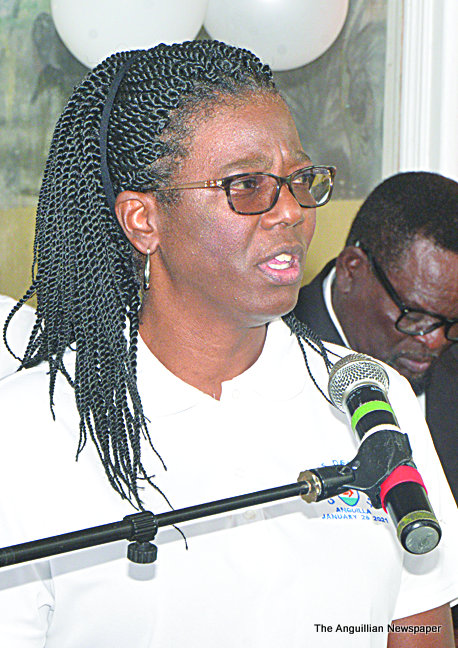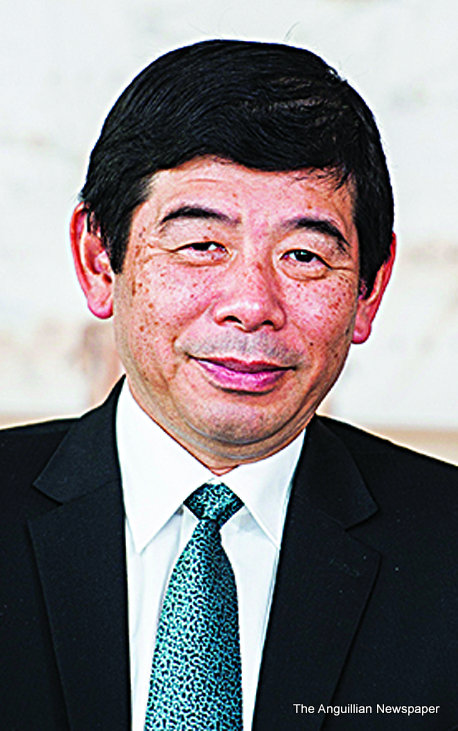Customs Officers in Anguilla joined their counterparts in the Caribbean, and elsewhere around the world, in observing International Customs Day 2021 on Tuesday, January 26.
Among the events was a message from the Secretary General of the World Customs Organisation, Dr. Kunio Mikuriya. It was read by the Head of the Audit Department in Anguilla, Mrs. Carolyn Richardson-Hodge.
The message touched on various matters including the leadership roles that Customs Officers are being called on to demonstrate, at the national and international levels, during the Covid-19 crisis — and attracted much applause from the Anguillian workers.
Following is the full text of the message:
“Once again, the Customs community comes together, united in celebrating International Customs Day, which officially falls on 26 January of each year. This special day enables WCO Members, the WCO Secretariat and Customs’ worldwide partners to dedicate themselves to taking forward a particular theme. Thus, throughout 2021, under the slogan “Customs bolstering Recovery, Renewal and Resilience for a sustainable supply chain,” the Customs community will be focusing on emerging from the global pandemic and support people and businesses by strengthening the global supply chain, reinforcing collaboration, harnessing technology and putting “people” at the centre of the transformation process.
“Indeed, as Customs will be moving to reconstruction in the wake of COVID-19, Members will be invited to embrace digital transformation at the borders, paying particular attention to automation, the use of innovative technologies, and the adoption of collaborative approaches with all stakeholders along the supply chain.
“Customs, being uniquely positioned and mandated at borders, can contribute to a sustainable supply chain in the following ways:
• Reinforcing collaboration to drive the Recovery process. The economic impact of the pandemic on companies has been colossal, with considerable disruption of global supply chains. The herculean task of reconstruction cannot be undertaken in isolation, and the expertise of all border agencies and stakeholders will be a decisive factor. Customs will be called upon to demonstrate its leadership during this process, at the national and international levels. The COVID-19 crisis has demonstrated that coordinated border management is possible, efficient, and canbe further institutionalized at international and national levels. The sound implementation of the SAFE Framework of Standards, including the AEO standards and cooperation with other government agencies, appears to be a relevant focus in this context. Given the increase in a commerce observed during the COVID-19 period, it would be timely for Members to implement the WCO E- Framework of Standards on Cross-Border E-Commerce in order to address security and facilitation in the context of this emerging supply chain trend, in close collaboration with stakeholders.
• Embracing advanced technologies to enable Renewal rather than return to how things were before. The COVID-19 pandemic has shown the importance of major innovative and technological concepts which the WCO has been promoting for years. These include all-digital and paperless clearance methods, and the use of technology for implementing effective controls and facilitating, enhancing and accelerating processes. Irrespective of the pandemic, Customs administrations have been sensitized – through specialized forums and conferences – about the benefits that can be reaped from the integration of technologies based on the use of big data, telematics and the Cloud into Customs operations. Building on the lessons learned, Customs administrations should look at the way goods are cleared at borders from a fresh perspective. Non-intrusive inspection devices, blockchain, artificial intelligence, sensors and connected objects, and other technological advances offer tangible benefits in terms of collecting, combining, sharing and analysing data, and these benefits should be maximized.
Putting “people” at the centre of change for a Resilient and sustainable supply chain. In order to address the vulnerability of Customs to systemic risks such as pandemics, Customs administrations will be called upon to build on the lessons learned and ensure that no one is left behind as we move towards a deeper transformation. To create greater resilience, “people” should be at the centre of the recovery model. Citizens around the globe have changed their daily lives drastically to adapt to the new reality. By the same token, Customs are called upon to rethink and adapt the way they operate, and enhance the preparedness of their staff through awareness raising and capacity building for the provision of a professional service. At the same time, resilience cannot be achieved without integrity, diversity and inclusion. A lack of integrity in Customs can distort trade and investment opportunities, undermine public trust in government administration and ultimately jeopardize the wellbeing of citizens, which in times of recovery could prove to be a recipe for failure.
“The WCO will continue to provide guidance, help to share best practices and information, and deliver capacity building and technical assistance support to Members for the achievement of the above goals.
“As in previous years, I am fully convinced that Customs administrations and the wider Customs community will rise to the occasion, fully committed to actively promoting their efforts and activities aimed at bolstering “Recovery, Renewal and Resilience for a sustainable supply chain” that includes sharing relevant practices and activities with others at WCO meetings and in key WCO publications.
Wishing you all a happy International Customs Day!”










